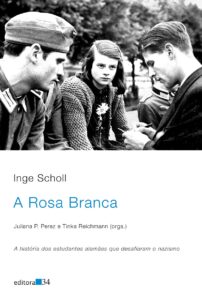Prof. Tinka Reichmann, University of Leipzig (Germany) and Prof. Juliana P. Perez, University of São Paulo (Brazil) describe a translation project by students of University of São Paulo (Brazil) of Inge Scholl’s book Die Weiße Rose, published in 2013, and deriving cultural and academic activities.
In 1943, five university students and a philosophy professor were issued with the death penalty by the “People’s Court” because of their resistance activities against the Nazis. This core group, their friends and supporters became known as the White Rose.
70 years later, the history of the White Rose and their activities was finally disseminated in Brazil with the first Portuguese translation of the book Die Weiße Rose by Inge Scholl (1953/1995). The publication is the result of a didactic and academic project conducted by two professors in the German Studies’ Department of the University of São Paulo (USP) in Brazil with the participation of eight students (Anna Carolina Schäfer, Eline de Assis Alves, Eraldo Souza dos Santos, Flora Azevedo Bonatto, Janaina Lopes Salgado, Luana de Julio de Camargo, Renata Benatti and Yasmin Cobaiachi Utida).
Several cultural, educational and academic activities have derived from this translators’ group since then. The first step was the creation of a study group on the White Rose and on Translation Studies. The Portuguese translation of Victor Klemperer’s LTI – Lingua Tertii Imperii and the movie Die Weiße Rose (1982) by Michael Verhoeven were important inputs for students’ interest and motivation not only on the history of the White Rose, but also on the language used by the Nazis as an effective manipulation tool. Dictionaries such as Vokabular des Nationalsozialismus (2007) by Cornelia Schmitz-Berning were very helpful to better understand the texts in Inge Scholl’s book.

Credit: Editora34.
Every student wrote an academic term paper on a specific topic related to the text they chose to translate, such as the translation of cultural markers (of German culture in general and of the Nazi organisation in particular) and of legal terms (related to the court verdict), the role of creativity in the translation process, identification and handling of biblical and philosophical references in translation etc.
One of the highlights was a visit of several students in Munich to the Institut für Zeitgeschichte, which keeps the whole documentation on Inge Scholl’s book, as well as to the White Rose Foundation, were they had access to a lot of material on the White Rose and also the possibility to interview M. Franz Müller, a supporter of the White Rose. He had not been condemned to death at that time because he was only 16 years old, but to a long prison sentence. What can be more fascinating than talking to somebody who had known some of the group members and experienced that time of history?
The book was then edited by the publishing house “Editora 34” in 2013 with translation funding by the Goethe-Institut of São Paulo. It is now available in the second edition, published in 2014. The White Rose group was very little known by the Brazilian public up to 2013 because of the lack of translations into Portuguese. The translation was crucial for the reception of the history about the White Rose. That is why were invited to the Book Fairs in Rio de Janeiro and in Fortaleza and to different cultural institutions to present the book.
Three Master’s theses were written by Anna Carolina Schäfer (2015), Yasmin Cobaiachi Utida (2016) and Janaina Lopes Salgado (2017) (follow the links for abstracts in English). Anna Carolina Schäfer and Eraldo Souza dos Santos are writing their doctoral theses. short descriptions are available in German.
The documentary Die Widerständigen: Zeugen der Weißen Rose (2008) by Katrin Seybold subtitled by Yasmin Utida was shown at several cultural and academic events and continues to fascinate and touch the public. As many former students are now working as German teachers, they conducted several didactic activities in schools with students between 14-18. A very impressive theatre performance by Leslie Marko’s group was shown at the Goethe-Institut in São Paulo. The exhibition panels offered by the White Rose Foundation were also translated by the group and are lent out by the Goethe-Institut.
Most publications of the group are written in Portuguese, with the exception of: Anna Carolina Schäfer and Tinka Reichmann (2016), “Die Übertragung von Inge Scholls Die Weiße Rose ins brasilianische Portugiesisch: zum didaktischen Potenzial eines Übersetzungsprojekts”. In: Doerte Andres; Julia Richter; Larisa Schippel (Hg.), Translation und ‘Drittes Reich’: Menschen – Entscheidungen – Folgen. Berlin: Frank & Timme, 323-336.










Drawing by Yasmin C. Utida for the exhibition catalogue.
Tinka Reichmann and Juliana P. Perez were working together in 2010 as professors at the German Studies Department at University of São Paulo (Brazil), when Juliana suggested that we translate the book “Die Weiße Rose” by Inge Scholl (1953/1995) into Portuguese, as the history of the White Rose was almost unknown to the Brazilian public by then due to the lack of translations. We changed it into a student project, which culminated in the publication with the publishing house “Editora 34” in 2013 with translation funding by the Goethe-Institut of São Paulo. It is available in the second edition 2014 with a planned reprintin 2020.